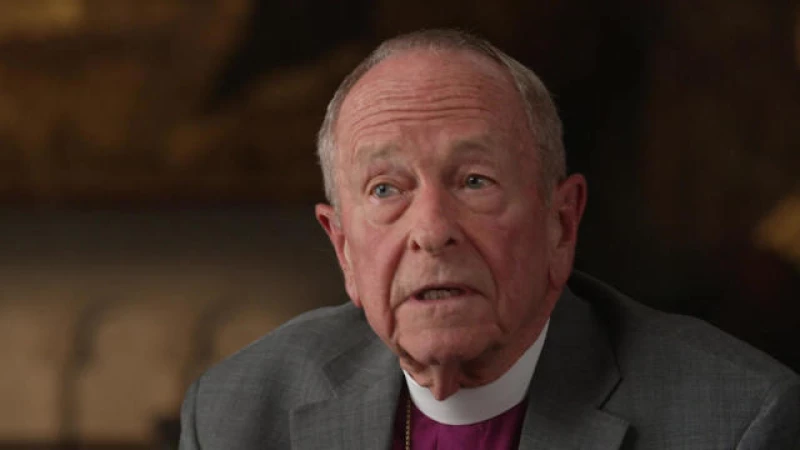The Episcopal Church Consecrates Gene Robinson as First Openly-Gay Bishop
In November 2003, the Episcopal Church made history by consecrating Gene Robinson as the 9th bishop of New Hampshire. However, what made the occasion even more controversial was the fact that Robinson wore a bullet-proof vest alongside his customary vestments.
Robinson, who is openly gay, emphasizes that there have always been gay bishops in the Episcopal Church. "There have been a lot of us, let's just be clear," he stated. "I'm just the first openly-gay one."
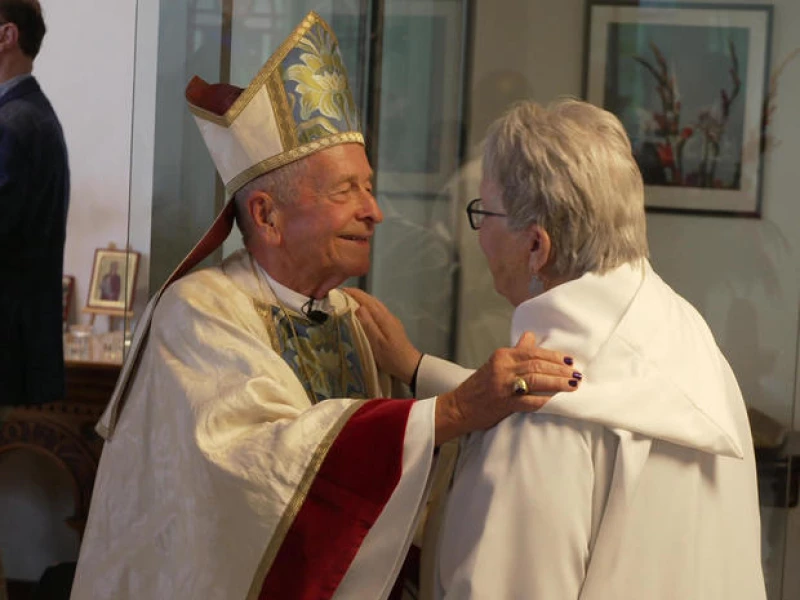
Recently, during a special celebration at St. Thomas Episcopal Church in Washington, D.C., Robinson made another bold statement. At 76 years old, he decided to paint his nails purple, becoming almost certainly the first Episcopal Bishop to do so.
"It pleases me to no end," Robinson expressed. "It's fanciful. I love purple. As you see, bishops wear a lot of purple. And I thought, 'You know what? I'm 76 years old. I can get my nails painted.'
Bishop Robinson Reflects on His Controversial Role
On a more serious note, Bishop Robinson reflected back on the climate in which he had been labelled the most dangerous man in the Anglican Church. "We forget what a big deal it was and how hard it was and how many people were opposed, and the pain it caused a lot of people," he said.
It had provoked immediate threats. The day he was elected, he received his first death threat before he got home: "I got a postcard, and it began, 'You fornicating, lecherous pig.' And that was to continue for two-and-a-half years."
At the time, Robinson was living with his partner, Mark Andrew, who later became his spouse. Robinson had previously been in a conventional marriage, until he and his wife, Isabella Martin, decided to divorce. "We were married for almost 14 years and have two wonderful daughters and two granddaughters. I get to see her and chat with her all the time," Robinson said.
So, when did his daughters learn that dad was different? "They were four and eight. And I sat with the eight-year-old. I said, 'You know what a lesbian is, right?' So, the eight-year-old said, 'Oh, oh, oh, yeah,' – very casual – 'Oh yeah, most men like women. And most women like men. But some men like men. And some women like women.' That's an A+ right there! So I said, 'I've learned that I'm one of those men who like men. And your mom and I have together decided that she deserves a chance to find someone who can love her in that special way. And I deserve the opportunity to find someone to love in my way.'"
It's all history now – almost 37 years since the divorce and since he came out publicly in his church; 20 years since he became a bishop; nine years since he and Mark divorced. And through it all, Bishop Robinson has become something of an institution. The Smithsonian wants to display his vestments. And he's often invited to speak at Washington's National Cathedral.
Koppel said, "What a dreadful life your predecessors must have lived, the gay bishops who were not identified as such."
"I can tell you from my own experience, and it's one of the things that led to my coming out: it's an awful thing to stand in a pulpit and encourage people to live authentic lives when you know you're not being authentic," Robinson said. "It's why I felt God called me out of the closet."
"Do you ever feel, 'You know, there's more to me than my sexuality'?"
"I didn't want to be the 'gay bishop,' I wanted to be a good bishop," said Robinson. "But I realized I wasn't in control of that. The media was going to make me the gay bishop whether I liked it or not. So, what I decided was, if I was gonna be the gay bishop, then I'd be the best damn gay bishop that I could ever be!"
Controversial? Oh, yes. Hundreds of parishes left the Episcopal Church. And it would be nearly seven years after Robinson's election as bishop before Mary Glasspool, a lesbian, was elected Suffragan, or assisting Bishop, of Los Angeles.
Now, though, there are five openly-gay bishops, including Bishop Thomas Brown of Maine, and Bishop Jeff Mello of Connecticut. They are all also married.
Bishop Robinson, who is retired, refers to them as his legacy.
Bishop Brown said, "I remember two different senior clergy assuring me that the fact that I was gay was not a concern. And of course, it was a concern. But compared to what I think it might have been like for Mary and for Bishop Robinson, it really wasn't a concern, that people had moved, that we got clear that the church was not gonna fall down. The people in Maine, I show up every Sunday at a different church. The first thing they say is, 'Where is Tom?' Because they really want my spouse there.'"
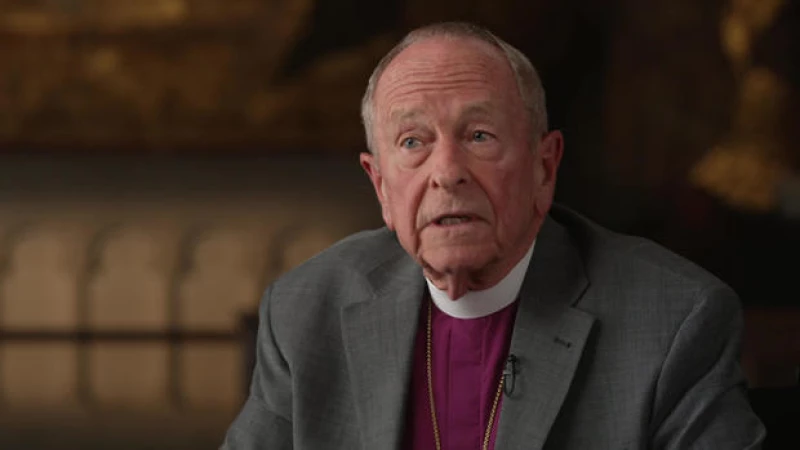
"I was never told, 'If you're gay, it's gonna be okay,'" said a bishop. "But I heard over and over and over again – 'God loves you.' My relationship with God is what got me through it all. And that's my greatest concern right now, when you say, are we tired of talking about our sexuality? I'm tired of it until I remember that there are still kids out there whose lives are being saved because they're seeing people who are living their lives openly."
Koppel asked, "Fifty years from now, what are they gonna say about the bishop?"
"That he was a prophet," said another bishop. "That he was courageous. And I think it costs a lot."
She described her own experience: "There was a period in college where I thought maybe God hated me because I was feeling erotically attracted to women. Finally, kind of in the middle of the night, God said to me, 'No. It's about love. And I love you.' If God hadn't said that to me, I don't think I'd be here."
Another bishop said, "I think the bishop, actually given the history of our church, I think in 50 years there will be a date on our calendar that will have his name to it, which is to say that he will be recorded in the calendar of saints."
Which brings us to the story of Matthew Shepard. In 1998, Matthew was 21, gay and a devoted Episcopalian, so perhaps it was inevitable that he would become something of a symbol, even a martyr, in the eyes of that church's first openly-gay bishop.
On a fateful night, Shepard was taken by two young men out onto the prairie and brutally beaten. In a bizarre twist, they hung him on a fence, disguising him as a scarecrow. When he was discovered, it was already too late. Shepard passed away six days later.
This heinous act of violence was a clear manifestation of anti-gay hatred, leaving Shepard's parents fearful of burying his ashes for fear of desecration. It took 20 years for them to approach Bishop Robinson, seeking a safe resting place for their son's remains at the National Cathedral in 2018.
And there, in the hallowed grounds of the cathedral, Shepard's ashes found their final resting place.
A solemn ceremony was held, overseen by Bishop Robinson, ensuring that Shepard would be protected from any further desecration. "He's safe here from the grave being desecrated," Bishop Robinson affirmed.
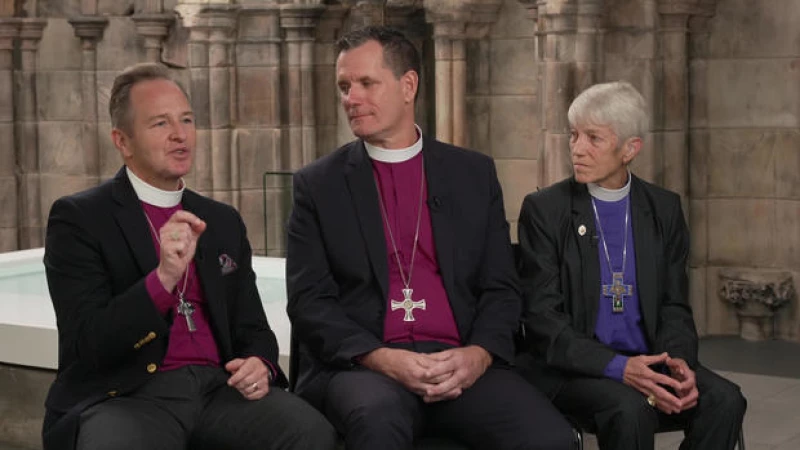
Thousands of people attended the memorial, including many from the LGBTQ community who had not always been embraced by their own churches. In his address to Matthew, Bishop Robinson's emotions ran high as he spoke not only to Shepard, but also to those who had faced similar struggles: "I have three things I want to say to Matt: Gently rest in this place … you are safe now … oh yeah, and Matt, welcome home. Amen."
Koppel inquired, "Who were you crying for?"
Gene Robinson, a bishop in the Episcopal Church, expressed his emotions and reflections on the violence faced by the LGBTQ+ community. He spoke about the significance of a particular moment in his life where he felt a sense of unity between his religious and LGBTQ+ identities. Robinson has spent his life trying to bridge the gap between the church and the gay community.
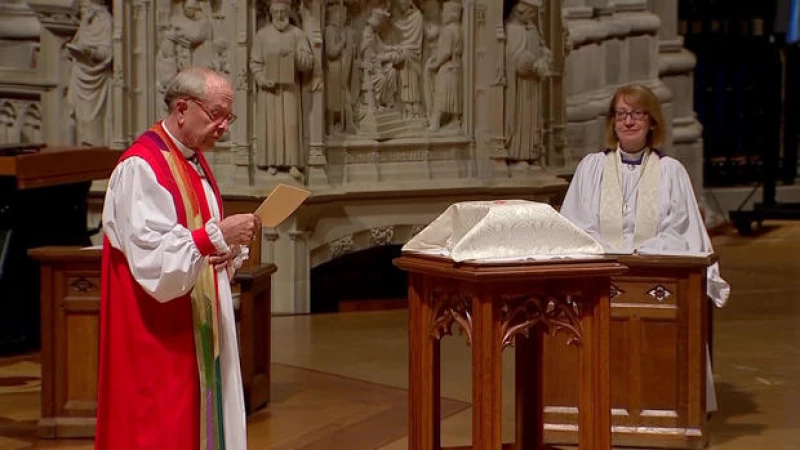
St. Thomas Episcopal Church has honored Robinson's dedication to both the gay community and the church by naming a modest chapel after him. Adjacent to the chapel is a columbarium, where the ashes of selected congregation members are kept. Robinson's name is inscribed on a box in the columbarium, bringing him a sense of peace and contentment.
Koppel jokingly mentioned the possibility of Robinson being sanctified in the future, to which Robinson responded with embarrassment. He humbly stated that he does not consider himself a saintly person, acknowledging his imperfections. However, he expressed satisfaction with the choices he has made in his life based on his faith.
For more info:
- The Right Rev. V. Gene Robinson, bishop-in-residence, St. Thomas' Parish, Washington, D.C.
- Bishop Mary Glasspool, the Episcopal Diocese of New York
- Bishop Thomas Brown, the Episcopal Diocese of Maine
- Bishop Jeff Mello, the Episcopal Church in Connecticut
Story produced by Deirdre Cohen and Robert Marston. Editor: Ed Givnish.

